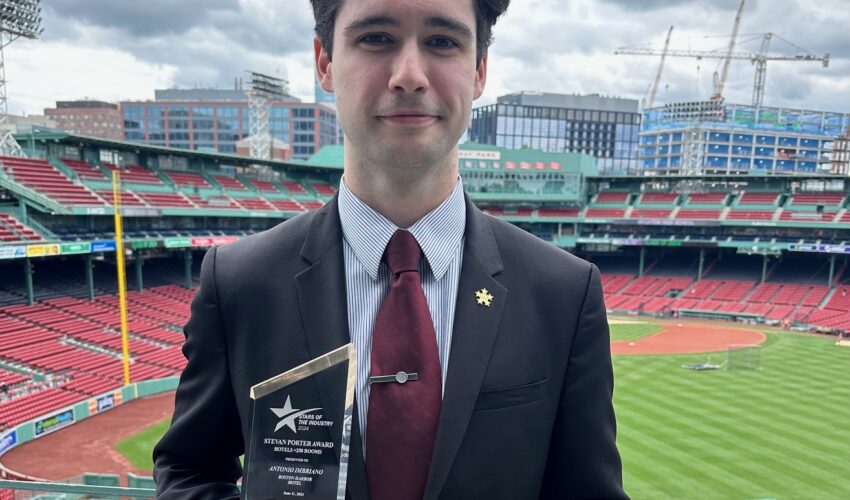I had the pleasure of attending the Mass Lodging Association’s 2024 Industry Star Awards last week with my wife Patricia at Fenway Park. It’s not an event we would normally attend; in fact, an event organizer for the MLA sent me an email inquiring about our attendance, as we were clearly not part of the industry. Our reason for attending was that our son Antonio, who just completed his first year in the industry at the Boston Harbor Hotel, was nominated for the Stevan Porter Award, recognizing the outstanding, emerging leader in the industry. As I understand, it is intended to honor hotel professionals under the age of 30. We were excited for Antonio’s nomination and wanted to support him.
When we arrived at the event we were introduced to Antonio’s colleagues at the hotel and were greeted with great compliments on Antonio’s work ethic, his professionalism and his standards in customer service. All things a parent loves to hear, and with the frosting on the parenting cake, accolades on what a wonderful job we did raising him. Needless to say, no matter how much we already knew these things, it’s hard not to beam with pride when you hear them from others. We chatted with Antonio’s colleagues about the hotel and how happy we were that Antonio was able to begin his career at a five-star hotel in Boston and learn the industry from talented leaders among the best in the business. Our conversation turned to customer service stories and going that extra mile for customers and clients, a topic that not only I feel versed in, but also captured in Winning the Customer and is what inspired this post.
Generally speaking, consumers really do not care about how they get what they want, if it’s reasonable or even possible. They just feel entitled to get what they want because they are giving a business their hard earned and/or valued money. This puts businesses in a constant state to be in a position to lose if they are not consistently on their game. To throw a bigger wrench in the workings of successful customer service, businesses rely on employees to execute and embody the level of service they expect. It is no wonder that customer service often is viewed as deficient and why you read all those negative reviews online. Even when businesses have trained and reinforced to their employees the utmost importance of exceptional customer service, it’s not surprising that the expectations outweigh the reality.
The more money that a consumer spends, the higher the expectations from the establishment. This is a very difficult predicament for all businesses, large and small, because typically the level of performance gets watered down as it trickles down from leadership to management to staff; making the mission of retaining and ensuring a customer’s happiness a Herculean effort if you do not have the right employees representing your organization. And in fairness, even the best employees can have bad days, after all, they are only human. In Winning the Customer I write about the measures needed to ensure that a consumer keeps coming back for a lifetime of spending and loyalty to a business, and I included many anecdotes to punctuate my philosophy concerning remarkable customer service. I am now able to add a new story to my repertoire.
As we were chatting about customer service and swapping stories with the BHH leadership, Antonio chimed in with a story of his own. It was game two of the NBA Finals, being held in Boston. It was a beautiful, clear night and the city was bustling. Antonio receives an inquiry from a hotel patron, who traveled to Boston with friends, celebrating a birthday. The three southern women had been looking for a Boston Cream Pie for the previous few days and had yet to find one and they hoped to sit in the restaurant at the hotel to accomplish their goal of having a Boston Cream Pie in Boston. Well, it’s 9pm, the kitchen at the hotel is winding down, and it’s unlikely that a Boston Cream Pie, which isn’t even on the menu (never mind the prospects of having all the ingredients in stock), is something the kitchen can whip up at the standards of a five-star award-winning kitchen. Still, Antonio’s response was, “Let me see what I can do.” In my mind this is quite risky because I always tell my employees that in managing expectations, if the answer is “no” you say “no,” if the answer is “maybe” you say “no,” and only if you’re absolutely sure it can happen, you say “yes.” “Let me see what I can do” sets an expectation level which could end up in dissatisfaction.
But with youthful exuberance and the GoDo mentality, Antonio began searching for Boston Cream Pies in Boston. In a matter of no time, he identified that the Boston Cream Pie was created in 1856 by chef Mossburg Sanzian at the Parker House Hotel in Boston. Antonio quickly rang up the Omni Parker House, told them the predicament he was in and asked them if they had Massachusetts’ official dessert on hand and if he could purchase an entire pie. He received an “absolutely” and ran out of the hotel, jumped on the “T” and acquired the target of his patron’s wishes. Antonio swiftly returned, Boston Cream Pie in hand, compliments of the Omni and with no charge, as they loved the exceptional customer service. He arrived and delivered it personally and gratis to very happy hotel guests.
“And the winner of the Stevan Porter Award for the outstanding, emerging leader is,” the emcee for the event, Jenny Johnson, the co-host of Dining Playbook, pauses, looks at Antonio, then me.
“Antonio Imbriano!”

